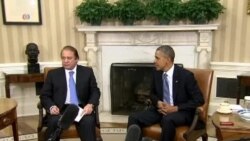WASHINGTON —
Pakistani Prime Minister Nawaz Sharif met with President Barack Obama at the White House on Wednesday to seek an end to drone strikes and to discuss Pakistan's role in the region after the U.S. withdrawal from Afghanistan. The two leaders also tackled some tough bilateral issues.
After the meeting with Sharif on Wednesday, Obama said the United States considers Pakistan an important strategic partner in South Asia.
"We believe that if Pakistan is secure and peaceful and prosperous, that's not only good for Pakistan, it's good for the region and it's good for the world," said Obama.
Obama praised Pakistan's efforts to spur economic development, and he promised U.S. support.
"We discussed how the United States could potentially be helpful on energy projects, on infrastructure projects. I applauded the prime minister for some of the reform steps that he has already taken. Not all of them are easy, but they promise to flip Pakistan's finances and economy on a more stable footing. And the prime minister emphasized how trade can be a powerful engine for growth as well," continued Obama.
Relations between the two countries have been strained since 2011, when U.S. Special Forces captured al-Qaida leader Osama bin Laden in his hideout in northeastern Pakistan without prior consultation with the Pakistani government. Later that year, a U.S. air strike mistakenly killed 24 Pakistani soldiers along the Afghan border.
Pakistanis also object to Washington's drone program, which targets terrorists but sometimes also kills civilians.
While Obama made no mention of drones Wednesday, Sharif said he asked Obama to end U.S. drone strikes in Pakistan.
"As in the past, we will continue to engage the United States of America in building [a] united, peaceful and stable Afghanistan. I told President Obama about my sincere commitment to build a cordial and cooperative relationship with India and our efforts to peacefully resolve all our outstanding issues, including Kashmir," said Sharif.
The withdrawal of the remaining U.S. forces from Afghanistan next year raises concerns that the Taliban will rise yet again and attempt to take control of the tribal areas along the Pakistan-Afghanistan border.
Sharif pledged to fight terrorism in his country, but his government has very little control in some of those border regions.
The Obama administration has repeatedly said drone strikes against terrorists will continue in areas that the government cannot protect from terrorists. The White House on Tuesday rejected Amnesty International's criticism of its drone program, saying the unmanned aircraft are used precisely to avoid civilian casualties.
After the meeting with Sharif on Wednesday, Obama said the United States considers Pakistan an important strategic partner in South Asia.
"We believe that if Pakistan is secure and peaceful and prosperous, that's not only good for Pakistan, it's good for the region and it's good for the world," said Obama.
Obama praised Pakistan's efforts to spur economic development, and he promised U.S. support.
"We discussed how the United States could potentially be helpful on energy projects, on infrastructure projects. I applauded the prime minister for some of the reform steps that he has already taken. Not all of them are easy, but they promise to flip Pakistan's finances and economy on a more stable footing. And the prime minister emphasized how trade can be a powerful engine for growth as well," continued Obama.
Relations between the two countries have been strained since 2011, when U.S. Special Forces captured al-Qaida leader Osama bin Laden in his hideout in northeastern Pakistan without prior consultation with the Pakistani government. Later that year, a U.S. air strike mistakenly killed 24 Pakistani soldiers along the Afghan border.
Pakistanis also object to Washington's drone program, which targets terrorists but sometimes also kills civilians.
While Obama made no mention of drones Wednesday, Sharif said he asked Obama to end U.S. drone strikes in Pakistan.
"As in the past, we will continue to engage the United States of America in building [a] united, peaceful and stable Afghanistan. I told President Obama about my sincere commitment to build a cordial and cooperative relationship with India and our efforts to peacefully resolve all our outstanding issues, including Kashmir," said Sharif.
The withdrawal of the remaining U.S. forces from Afghanistan next year raises concerns that the Taliban will rise yet again and attempt to take control of the tribal areas along the Pakistan-Afghanistan border.
Sharif pledged to fight terrorism in his country, but his government has very little control in some of those border regions.
The Obama administration has repeatedly said drone strikes against terrorists will continue in areas that the government cannot protect from terrorists. The White House on Tuesday rejected Amnesty International's criticism of its drone program, saying the unmanned aircraft are used precisely to avoid civilian casualties.





